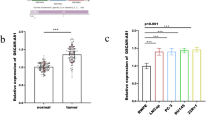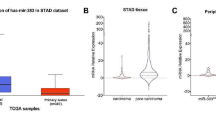Abstract
Many cervical cancer (CC) patients experience early cancer metastasis, resulting in poor therapeutic outcome after resection of primary cancer. Hence, there is a compelling requirement for understanding of the molecular mechanisms underlying the invasiveness control of CC. Pituitary tumor-transforming gene 1 (Pttg1) has been recently reported to promote cancer cell growth and metastasis in a number of various tumors. However, its regulation by microRNAs (miRNAs) as well as its role in CC have not been clarified. Here, we reported significantly higher levels of Pttg1 and significantly lower levels of miR-494 in the resected CC tissue, compared with the adjacent normal cervical tissue from the same patient. Interestingly, Pttg1 levels inversely correlated with miR-494 levels. In vitro, Pttg1 levels determined CC cell invasiveness and were inhibited by miR-494 levels. However, miR-494 levels were not affected by Pttg1 levels. Furthermore, miR-494 inhibited Pttg1 expression in CC cells, through directly binding and inhibition on 3′-UTR of Pttg1 mRNA. Together, our data suggest that Pttg1 may increase CC cell metastasis, which is negatively regulated by miR-494. Our work thus highlights a novel molecular regulatory machinery in metastasis of CC.





Similar content being viewed by others
References
Kanayama T, Mabuchi S, Fujita M, Kimura T. Calcaneal metastasis in uterine cervical cancer: a case report and a review of the literature. Eur J Gynaecol Oncol. 2012;33:524–5.
Setoodeh R, Hakam A, Shan Y. Cerebral metastasis of cervical cancer, report of two cases and review of the literature. Int J Clin Exp Pathol. 2012;5:710–4.
Peters P, Bandi H, Efendy J, Perez-Smith A, Olson S. Rapid growth of cervical cancer metastasis in the brain. J Clin Neurosci. 2010;17:1211–2.
Chen B, Zhang C, Dong P, Guo Y, Mu N. Molecular regulation of cervical cancer growth and invasion by VEGFA. Tumour Biol. 2014;35:11587–93.
Yu R, Ren SG, Horwitz GA, Wang Z, Melmed S. Pituitary tumor transforming gene (pttg) regulates placental JEG-3 cell division and survival: evidence from live cell imaging. Mol Endocrinol. 2000;14:1137–46.
Caporali S, Alvino E, Levati L, Esposito AI, Ciomei M, Brasca MG, et al. Down-regulation of the pttg1 proto-oncogene contributes to the melanoma suppressive effects of the cyclin-dependent kinase inhibitor PHA-848125. Biochem Pharmacol. 2012;84:598–611.
Vlotides G, Eigler T, Melmed S. Pituitary tumor-transforming gene: physiology and implications for tumorigenesis. Endocr Rev. 2007;28:165–86.
Tfelt-Hansen J, Kanuparthi D, Chattopadhyay N. The emerging role of pituitary tumor transforming gene in tumorigenesis. Clin Med Res. 2006;4:130–7.
Panguluri SK, Yeakel C, Kakar SS. Pttg: an important target gene for ovarian cancer therapy. J Ovarian Res. 2008;1:6.
El-Naggar SM, Malik MT, Kakar SS. Small interfering RNA against Pttg: a novel therapy for ovarian cancer. Int J Oncol. 2007;31:137–43.
Chen G, Li J, Li F, Li X, Zhou J, Lu Y, et al. Inhibitory effects of anti-sense Pttg on malignant phenotype of human ovarian carcinoma cell line SK-OV-3. J Huazhong Univ Sci Technol Med Sci = Hua zhong ke ji da xue xue bao Yi xue Ying De wen ban = Huazhong keji daxue xuebao Yixue Yingdewen ban. 2004;24:369–72.
Yan S, Zhou C, Lou X, Xiao Z, Zhu H, Wang Q, et al. Pttg overexpression promotes lymph node metastasis in human esophageal squamous cell carcinoma. Cancer Res. 2009;69:3283–90.
Zhou C, Liu S, Zhou X, Xue L, Quan L, Lu N, et al. Overexpression of human pituitary tumor transforming gene (hpttg), is regulated by beta-catenin/TCF pathway in human esophageal squamous cell carcinoma. Int J Cancer. 2005;113:891–8.
Shibata Y, Haruki N, Kuwabara Y, Nishiwaki T, Kato J, Shinoda N, et al. Expression of Pttg (pituitary tumor transforming gene) in esophageal cancer. Jpn J Clin Oncol. 2002;32:233–7.
Zhang ML, Lu S, Zheng SS. Epigenetic changes of pituitary tumor-derived transforming gene 1 in pancreatic cancer. Hepatobil Pancreat Dis Int. 2008;7:313–7.
Ai J, Zhang Z, Xin D, Zhu H, Yan Q, Xin Z, et al. Identification of over-expressed genes in human renal cell carcinoma by combining suppression subtractive hybridization and cDNA library array. Sci China C Life Sci. 2004;47:148–57.
Dominguez A, Ramos-Morales F, Romero F, Rios RM, Dreyfus F, Tortolero M, et al. Hpttg, a human homologue of rat Pttg, is overexpressed in hematopoietic neoplasms. Evidence for a transcriptional activation function of hpttg. Oncogene. 1998;17:2187–93.
Zhou C, Tong Y, Wawrowsky K, Melmed S. Pttg acts as a stat3 target gene for colorectal cancer cell growth and motility. Oncogene. 2014;33:851–61.
Kim DS, Franklyn JA, Smith VE, Stratford AL, Pemberton HN, Warfield A, et al. Securin induces genetic instability in colorectal cancer by inhibiting double-stranded DNA repair activity. Carcinogenesis. 2007;28:749–59.
Huang SQ, Liao QJ, Wang XW, Xin DQ, Chen SX, Wu QJ, et al. RNAi-mediated knockdown of pituitary tumor-transforming gene-1 (Pttg1) suppresses the proliferation and invasive potential of PC3 human prostate cancer cells. Braz J Med Biol Res. 2012;45:995–1001.
Huang S, Liao Q, Li L, Xin D. Pttg1 inhibits smad3 in prostate cancer cells to promote their proliferation. Tumour Biol. 2014;35:6265–70.
Castilla C, Flores ML, Medina R, Perez-Valderrama B, Romero F, Tortolero M, et al. Prostate cancer cell response to paclitaxel is affected by abnormally expressed securin Pttg1. Mol Cancer Ther. 2014;13:2372–83.
Cao XL, Gao JP, Wang W, Xu Y, Shi HY, Zhang X. Expression of pituitary tumor transforming gene 1 is an independent factor of poor prognosis in localized or locally advanced prostate cancer cases receiving hormone therapy. Asian Pac J Cancer Prev. 2012;13:3083–8.
Castilla C, Flores ML, Conde JM, Medina R, Torrubia FJ, Japon MA, et al. Downregulation of protein tyrosine phosphatase ptpl1 alters cell cycle and upregulates invasion-related genes in prostate cancer cells. Clin Exp Metastasis. 2012;29:349–58.
Singh SV, Powolny AA, Stan SD, Xiao D, Arlotti JA, Warin R, et al. Garlic constituent diallyl trisulfide prevents development of poorly differentiated prostate cancer and pulmonary metastasis multiplicity in tramp mice. Cancer Res. 2008;68:9503–11.
Bacac M, Provero P, Mayran N, Stehle JC, Fusco C, Stamenkovic I. A mouse stromal response to tumor invasion predicts prostate and breast cancer patient survival. PLoS One. 2006;1:e32.
Crosby ME, Jacobberger J, Gupta D, Macklis RM, Almasan A. E2f4 regulates a stable G2 arrest response to genotoxic stress in prostate carcinoma. Oncogene. 2007;26:1897–909.
Zhu X, Mao Z, Na Y, Guo Y, Wang X, Xin D. Significance of pituitary tumor transforming gene 1 (Pttg1) in prostate cancer. Anticancer Res. 2006;26:1253–9.
Di Leva G, Croce CM. MiRNA profiling of cancer. Curr Opin Genet Dev. 2013;23:3–11.
Pereira DM, Rodrigues PM, Borralho PM, Rodrigues CM. Delivering the promise of miRNA cancer therapeutics. Drug Discov Today. 2013;18:282–9.
He W, Li Y, Chen X, Lu L, Tang B, Wang Z, et al. Mir-494 acts as an anti-oncogene in gastric carcinoma by targeting c-myc. J Gastroenterol Hepatol. 2014;29:1427–34.
Zhou RP, Chen G, Shen ZL, Pan LQ. Cinobufacin suppresses cell proliferation via mir-494 in BGC-823 gastric cancer cells. Asian Pac J Cancer Prev. 2014;15:1241–5.
Bai Y, Sun Y, Peng J, Liao H, Gao H, Guo Y, et al. Overexpression of secretagogin inhibits cell apoptosis and induces chemoresistance in small cell lung cancer under the regulation of mir-494. Oncotarget. 2014;5:7760–75.
Romano G, Acunzo M, Garofalo M, Di Leva G, Cascione L, Zanca C, et al. Mir-494 is regulated by ERK1/2 and modulates trail-induced apoptosis in non-small-cell lung cancer through bim down-regulation. Proc Natl Acad Sci U S A. 2012;109:16570–5.
Liborio-Kimura TN, Jung HM, Chan EK. Mir-494 represses hoxa10 expression and inhibits cell proliferation in oral cancer. Oral Oncol. 2015;51:151–7.
Ries J, Vairaktaris E, Agaimy A, Kintopp R, Baran C, Neukam FW, et al. Mir-186, mir-3651 and mir-494: potential biomarkers for oral squamous cell carcinoma extracted from whole blood. Oncol Rep. 2014;31:1429–36.
Kwak SY, Yang JS, Kim BY, Bae IH, Han YH. Ionizing radiation-inducible mir-494 promotes glioma cell invasion through EGFR stabilization by targeting p190b RhoGap. Biochim Biophys Acta. 1843;2014:508–16.
Asuthkar S, Velpula KK, Nalla AK, Gogineni VR, Gondi CS, Rao JS. Irradiation-induced angiogenesis is associated with an mmp-9-mir-494-syndecan-1 regulatory loop in medulloblastoma cells. Oncogene. 2014;33:1922–33.
Puck TT, Marcus PI, Cieciura SJ. Clonal growth of mammalian cells in vitro; growth characteristics of colonies from single Hela cells with and without a feeder layer. J Exp Med. 1956;103:273–83.
Liang CC, Park AY, Guan JL. In vitro scratch assay: a convenient and inexpensive method for analysis of cell migration in vitro. Nat Protoc. 2007;2:329–33.
Solbach C, Roller M, Peters S, Nicoletti M, Kaufmann M, Knecht R. Pituitary tumor-transforming gene (Pttg): a novel target for anti-tumor therapy. Anticancer Res. 2005;25:121–5.
Yamanaka S, Campbell NR, An F, Kuo SC, Potter JJ, Mezey E, et al. Coordinated effects of microRNA-494 induce G(2)/M arrest in human cholangiocarcinoma. Cell Cycle. 2012;11:2729–38.
Conflicts of interest
None.
Author information
Authors and Affiliations
Corresponding author
Additional information
The Publisher and Editor retract this article in accordance with the recommendations of the Committee on Publication Ethics (COPE). After a thorough investigation we have strong reason to believe that the peer review process was compromised.
An erratum to this article is available at http://dx.doi.org/10.1007/s13277-017-5487-6.
About this article
Cite this article
Chen, B., Hou, Z., Li, C. et al. RETRACTED ARTICLE: MiRNA-494 inhibits metastasis of cervical cancer through Pttg1. Tumor Biol. 36, 7143–7149 (2015). https://doi.org/10.1007/s13277-015-3440-0
Received:
Accepted:
Published:
Issue Date:
DOI: https://doi.org/10.1007/s13277-015-3440-0




